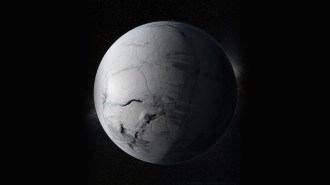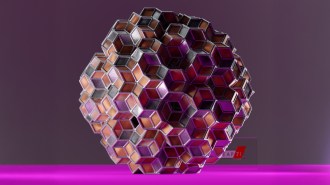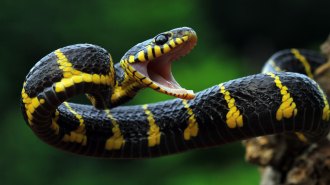News
-
 Health & Medicine
Health & MedicineThis itch-triggering protein also sends signals to stop scratching
The TRPV4 protein’s dual nature, found in studies with mice, may complicate the hunt for human itch treatments
-
 Health & Medicine
Health & MedicineMeds like Ozempic could ease arthritis
A study in mice and people with osteoarthritis suggests semaglutide can bulk up cartilage between bones, though bigger trials are needed to confirm.
By Meghan Rosen -
 Climate
ClimateHalting irreversible changes to Antarctica depends on choices made today
Antarctic Peninsula projections show accelerating ice loss, warming oceans and global sea level impacts tied to greenhouse gas emissions.
-
 Chemistry
ChemistryMachine learning streamlines the complexities of making better proteins
The framework predicts how proteins will function with several interacting mutations and finds combinations that work well together.
By Skyler Ware -
 Climate
ClimateSnowball Earth might have had a dynamic climate and open seas
Sediments from Scotland hint that ocean-atmosphere interactions continued more than 600 million years ago despite widespread ice.
-
 Paleontology
PaleontologyA mouth built for efficiency may have helped the earliest bird fly
A flexible tongue, sensitive beak and teethlike cones in the mouth may have helped Archaeopteryx generate enough energy to fly.
By Jay Bennett -
 Animals
AnimalsSome dog breeds carry a higher risk of breathing problems
Research reveals more short-snouted dogs besides pugs and bulldogs that struggle with breathing. Pekingese and Japanese Chins topped the study's list.
By Jake Buehler -
 Animals
AnimalsRegeneration of fins and limbs relies on a shared cellular playbook
The findings strengthen the case that regeneration is an old trait, offering insights into how complex tissues rebuild themselves.
-
 Physics
PhysicsPhysicists dream up ‘spacetime quasicrystals’ that could underpin the universe
Quasicrystals are orderly structures that never repeat. Scientists just showed they can exist in space and time.
-
 Animals
AnimalsSome snakes lack the ‘hunger hormone.’ Experts are hungry to know why
The complex biology of ghrelin, the hunger hormone, has researchers wondering how its absence helps snakes last a long time with no food, if at all.
By Andrea Lius -
 Artificial Intelligence
Artificial IntelligenceReal-world medical questions stump AI chatbots
Subtle shifts in how users described symptoms to AI chatbots led to dramatically different, sometimes dangerous medical advice.
-
 Oceans
OceansEvolution didn’t wait long after the dinosaurs died
New plankton arrived just a few millennia — maybe even decades — after the Chicxulub asteroid, forcing a rethink of evolution's catastrophe response speed.
By Elie Dolgin